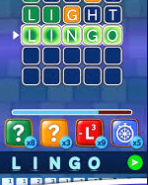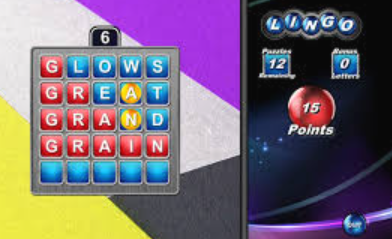Lingo is a popular word-guessing game that combines elements of traditional word puzzles and online gaming. Originating as a television game show, Lingo has captivated millions of players with its engaging mechanics and fun challenges. The game is relatively simple but still offers plenty of depth for players to enjoy. Whether you're a fan of word games or just looking for a new way to pass the time, Lingo can provide hours of entertainment.

In this article, we’ll cover everything you need to know about playing Lingo online. From understanding the game’s mechanics to tips for improving your word-guessing skills, we’ll provide a comprehensive guide to help you become a Lingo master.
How to Play Bingo Online
Game Mechanics
The basic gameplay of Lingo is both simple and satisfying. Players are tasked with guessing a hidden five-letter word within six attempts. After each guess, the game provides feedback that helps guide the next guess. The game uses different colors to indicate the accuracy of each letter in the guess:
Yellow: The letter is in the word but not in the correct position.
Green: The letter is in the word and the correct position.
Gray: The letter is not in the word at all.
The goal of the game is to use these clues to systematically eliminate incorrect letters and determine the correct word in as few attempts as possible. The fun of Lingo comes from the challenge of deducing the word with the limited feedback provided, making it both a test of memory and logic.
Getting Started with Lingo Online
To start playing Lingo online, you’ll first need to choose a platform that offers the game. There are several websites and mobile apps where you can find Lingo variations, some of which are free to play while others may require a subscription or one-time purchase. After choosing a platform, you’ll be guided through the process of starting a new game. Once you’re ready, simply enter your first guess and see what feedback you receive.
The game will then prompt you to continue guessing, with each new word taking you closer to solving the puzzle. It’s important to note that Lingo typically has a time limit, so you’ll need to think quickly and strategically. This time pressure adds an exciting element to the game, making each round feel like a mini-challenge.
Game Strategies and Tips
Lingo is a game of strategy and skill. While it may seem simple at first, the game can become quite challenging as you move through more difficult levels. To help you improve your Lingo skills, here are some strategies and tips to keep in mind:
Start with Common Vowels and Consonants: Since Lingo words are five letters long, starting with common vowels (like “A” or “E”) and consonants (such as “T” or “S”) is a smart strategy. Guessing words that include these common letters will give you useful information about which letters might appear in the hidden word.
Use Feedback to Your Advantage: Pay close attention to the feedback provided after each guess. Yellow tiles tell you that the letter is part of the word but not in the correct position, while green tiles confirm that a letter is correctly placed. By keeping track of this feedback, you can eliminate incorrect guesses and narrow down the possibilities.
Be Systematic: While it may be tempting to guess random words, a more systematic approach is often more effective. Focus on guessing words that follow a logical progression based on the feedback you’ve received. For example, if you know a particular letter is part of the word but not in the correct position, try moving it around in your next guesses.
Avoid Repeating Letters: Repeating letters that you know are not part of the word can be a waste of valuable attempts. If you’ve already guessed a letter that has been marked gray (not in the word), it’s a good idea to avoid using that letter again.
Think About Word Patterns: As you narrow down the possibilities, think about common word patterns. For example, if you know the word ends in “-ed,” try guessing words that fit that pattern. Recognizing common word structures can help you make educated guesses and increase your chances of success.
The Benefits of Playing Lingo Online
Lingo isn’t just a fun and engaging game—it also has several cognitive benefits that can help you improve your language skills and mental agility. Here are some reasons why playing Lingo online can be a great way to spend your free time:
1. Boosts Vocabulary
One of the main benefits of playing word games like Lingo is that they help expand your vocabulary. As you encounter new words during gameplay, you’re likely to learn their meanings and become more familiar with their spellings. This can improve your overall language skills, making you more proficient at writing and speaking.
2. Enhances Cognitive Function
Lingo requires players to think critically and quickly, helping to enhance cognitive function. By solving word puzzles, you’re stimulating your brain, improving your memory, and enhancing your problem-solving skills. Regularly playing word games can keep your mind sharp and may even reduce the risk of cognitive decline as you age.
3. Improves Spelling Skills
Since Lingo involves spelling words correctly, it’s an excellent way to improve your spelling skills. The game encourages attention to detail and accuracy, helping you become more mindful of how words are spelled and which letter combinations are most common.
4. Fun and Stress-Relieving
Playing Lingo can be a great way to unwind after a long day. The simplicity of the game makes it easy to pick up and play whenever you have a few minutes of downtime. The challenge of solving each puzzle keeps you engaged, while the sense of accomplishment you get from completing a word provides a satisfying, stress-relieving experience.
Where to Play Lingo Online
There are several platforms where you can play Lingo online. Some websites offer the classic version of the game, while others feature unique twists or different formats. Here are a few popular places to find Lingo games:
1. Lingo Game Website
The official Lingo website offers a simple version of the game. You can play directly on your browser without needing to download any software. This version of the game is perfect for those who enjoy the classic gameplay and don’t want any distractions.
2. Mobile Apps
Several mobile apps offer Lingo-style games, allowing you to play on the go. These apps are available for both iOS and Android devices, and they often come with additional features, such as daily challenges or multiplayer options. Look for apps with positive reviews and user ratings to ensure you're getting a high-quality experience.
3. Third-Party Game Sites
If you prefer a variation of the traditional Lingo game, there are plenty of third-party websites that offer different versions or challenges. Some sites may offer special themes, more difficult levels, or multiplayer modes. Explore different platforms to find the Lingo experience that best suits your preferences.

FAQs About Playing Bingo Online
Q1: How many attempts do I have to guess the word in Lingo?
In most versions of Lingo, you have six attempts to guess the correct word. With each guess, the game provides feedback on which letters are correct and in the correct position, helping you narrow down your options.
Q2: Is there a time limit for each round of Lingo?
Depending on the platform you’re playing on, there may or may not be a time limit. Some versions of Lingo have a time limit to add a sense of urgency, while others allow you to take your time. Check the rules of the specific version you’re playing to see if there is a time constraint.
Q3: Can I play Lingo offline?
Many versions of Lingo can be played offline, especially mobile apps. If you prefer to play without an internet connection, look for a version that offers offline gameplay.
Q4: Is Lingo available in languages other than English?
Yes, some versions of Lingo are available in multiple languages, allowing players from around the world to enjoy the game in their native language. Look for regional versions or language options within the game settings.
Q5: Can I play Lingo with friends?
Yes, several Lingo platforms offer multiplayer options, allowing you to compete with friends or other players online. This adds a fun social element to the game and makes it even more competitive.
Conclusion
Lingo is a fantastic word game that combines simple mechanics with deep strategy. Whether you’re a casual player or a competitive puzzle solver, Lingo offers something for everyone. With its easy-to-learn rules, engaging gameplay, and cognitive benefits, it’s no wonder that Lingo has become a favorite pastime for word game enthusiasts.
By following the strategies and tips outlined in this guide, you can improve your word-guessing skills and tackle even the toughest Lingo puzzles. So, what are you waiting for? Start playing Lingo online today and see how quickly you can become a master of word puzzles!